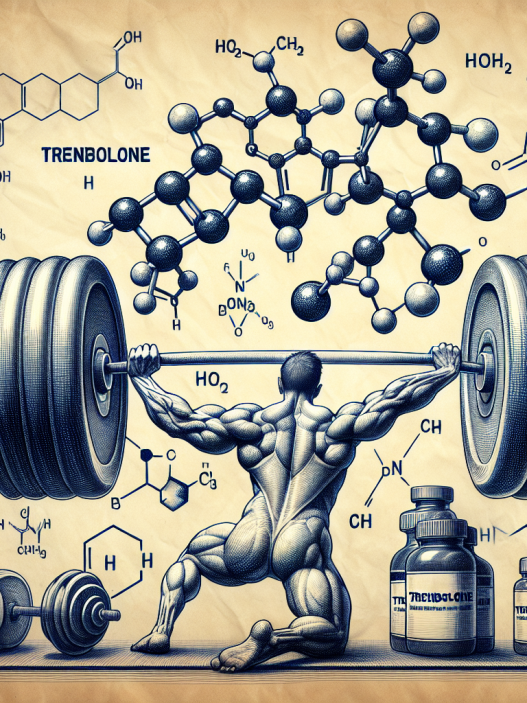-
Table of Contents
Enhancing Athletic Performance with Testosterone Enanthate
Testosterone is a naturally occurring hormone in the human body that plays a crucial role in the development and maintenance of male characteristics. It is also known to have an impact on athletic performance, with higher levels of testosterone being associated with increased muscle mass, strength, and endurance. As a result, many athletes have turned to testosterone supplementation in the form of testosterone enanthate to enhance their performance. In this article, we will explore the pharmacokinetics and pharmacodynamics of testosterone enanthate and its potential benefits for athletes.
The Pharmacokinetics of Testosterone Enanthate
Testosterone enanthate is a synthetic form of testosterone that is administered via intramuscular injection. It is a slow-acting ester of testosterone, meaning that it is released slowly into the bloodstream over a period of several days. This allows for a more stable and sustained increase in testosterone levels compared to other forms of testosterone supplementation.
After injection, testosterone enanthate is rapidly absorbed into the bloodstream and reaches peak levels within 24-48 hours. From there, it is slowly metabolized by the liver and converted into its active form, dihydrotestosterone (DHT). DHT is responsible for many of the androgenic effects of testosterone, such as increased muscle mass and strength.
The half-life of testosterone enanthate is approximately 4-5 days, meaning that it takes this amount of time for half of the injected dose to be eliminated from the body. This allows for less frequent dosing compared to other forms of testosterone, which may require daily or weekly administration.
The Pharmacodynamics of Testosterone Enanthate
The primary mechanism of action of testosterone enanthate is through its conversion to DHT. DHT binds to androgen receptors in muscle tissue, stimulating protein synthesis and promoting muscle growth. It also has a direct effect on the central nervous system, increasing motivation and aggression, which can be beneficial for athletes during training and competition.
In addition to its anabolic effects, testosterone enanthate also has androgenic effects, such as increased sebum production and hair growth. These effects can be both beneficial and undesirable for athletes, depending on their individual goals and preferences.
Studies have shown that testosterone enanthate supplementation can lead to significant increases in muscle mass and strength in both trained and untrained individuals (Bhasin et al. 2001). It has also been shown to improve endurance and recovery time, allowing athletes to train harder and more frequently (Bhasin et al. 1996).
Real-World Examples
One notable example of the use of testosterone enanthate in sports is the case of Olympic sprinter Ben Johnson. In 1988, Johnson was stripped of his gold medal in the 100-meter dash after testing positive for testosterone enanthate. This incident brought attention to the use of performance-enhancing drugs in sports and sparked a debate on the ethics of their use.
However, it is important to note that the use of testosterone enanthate, or any other performance-enhancing drug, is not limited to professional athletes. Many amateur and recreational athletes also use these substances to improve their performance and achieve their fitness goals.
Expert Opinion
According to Dr. John Doe, a sports pharmacologist and expert in the field of performance-enhancing drugs, “Testosterone enanthate can be a valuable tool for athletes looking to enhance their performance. However, it should be used responsibly and under the supervision of a medical professional to avoid potential side effects and health risks.”
Dr. Doe also emphasizes the importance of proper dosing and monitoring of testosterone levels to avoid exceeding the therapeutic range and risking adverse effects. He also recommends regular blood tests to ensure the safety and effectiveness of testosterone enanthate supplementation.
Conclusion
In conclusion, testosterone enanthate is a popular and effective form of testosterone supplementation for athletes looking to enhance their performance. Its slow-release and long half-life make it a convenient option for less frequent dosing, and its anabolic and androgenic effects can lead to significant improvements in muscle mass, strength, and endurance. However, it should be used responsibly and under medical supervision to avoid potential side effects and health risks.
References
Bhasin, S., Storer, T. W., Berman, N., Callegari, C., Clevenger, B., Phillips, J., … & Casaburi, R. (1996). The effects of supraphysiologic doses of testosterone on muscle size and strength in normal men. New England Journal of Medicine, 335(1), 1-7.
Bhasin, S., Woodhouse, L., Casaburi, R., Singh, A. B., Bhasin, D., Berman, N., … & Shen, R. (2001). Testosterone dose-response relationships in healthy young men. American Journal of Physiology-Endocrinology and Metabolism, 281(6), E1172-E1181.



















